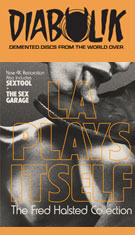
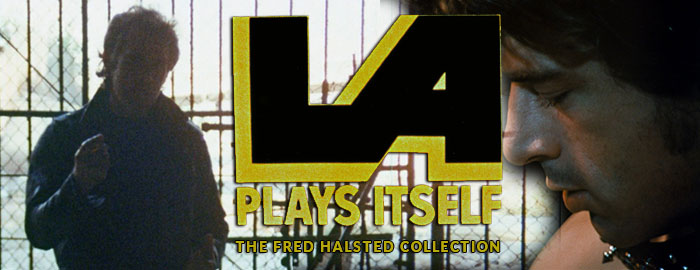
Color, 1972-1975, 151 mins.
Directed by Fred Halsted
Altered Innocence (Blu-ray & DVD) (US R0 HD/NTSC)
The sudden explosion of 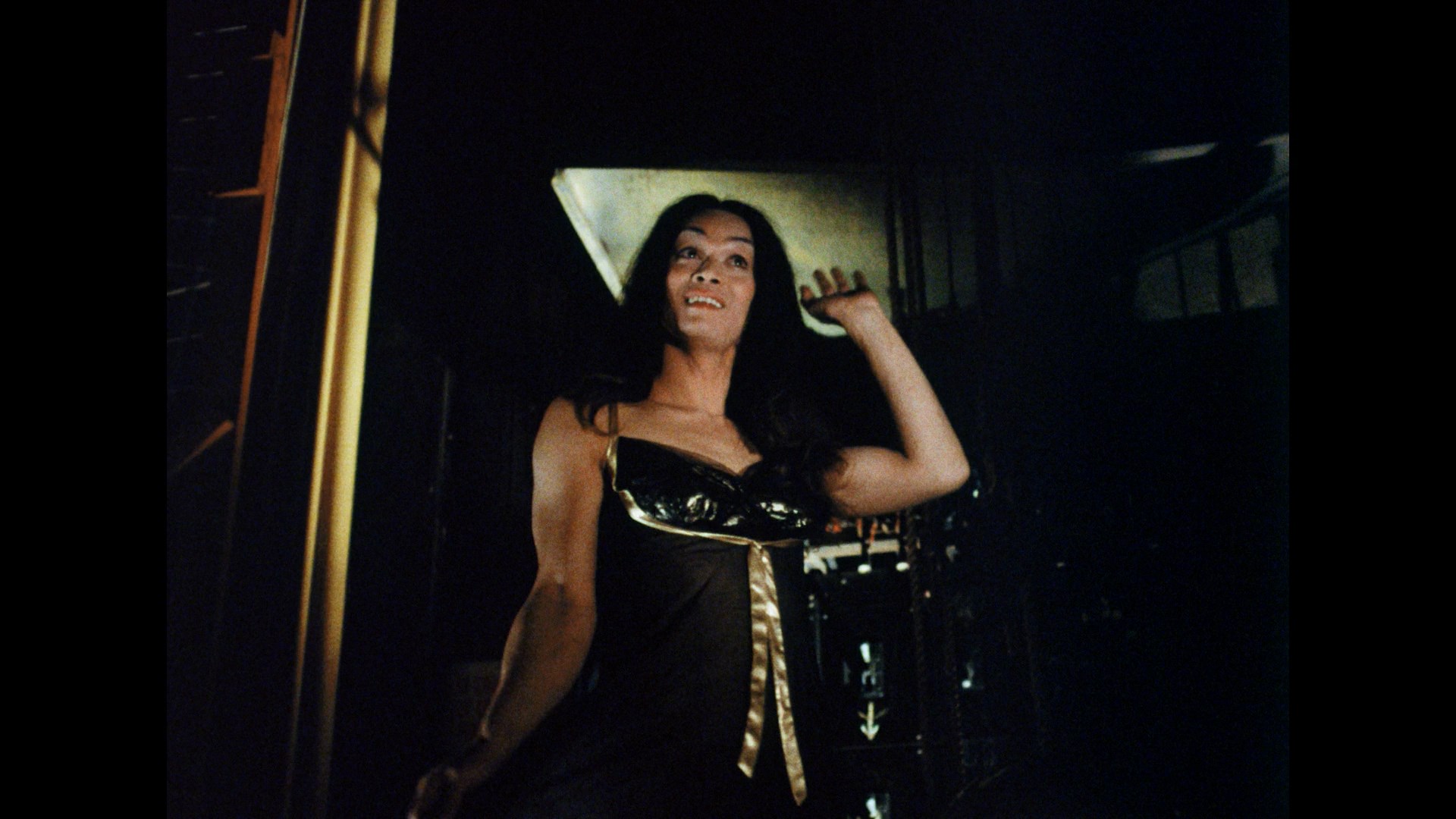 milestone filmmaking in the adult film industry throughout the
milestone filmmaking in the adult film industry throughout the 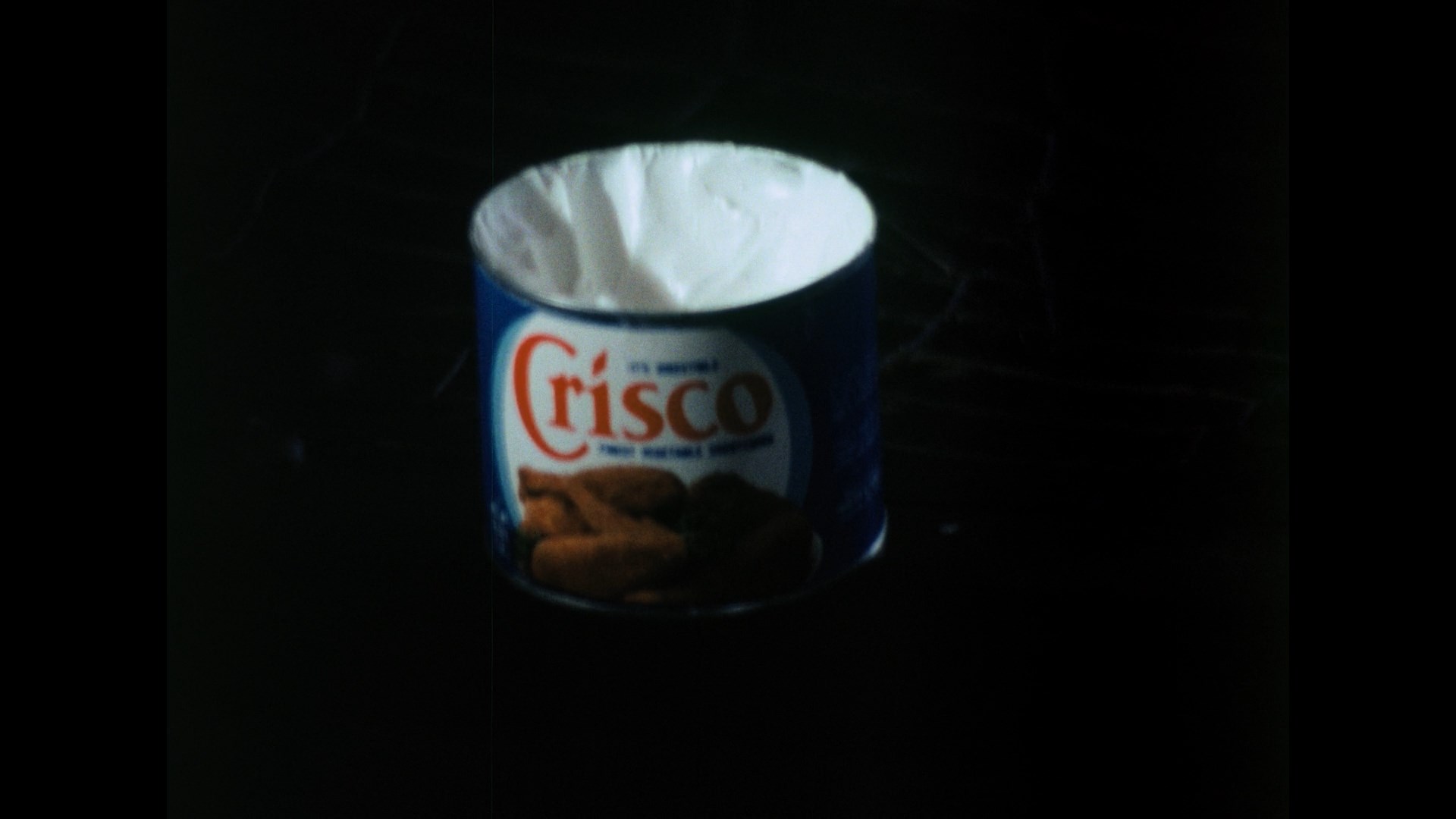 '70s and early '80s is one that film historians and mainstream video companies are still coming to terms with to varying degrees, from the most mainstream-ish porno chic hits to the grungiest extreme filmmakers who sent Congress into hissyfits. Where the straight XXX world was pushed to its darkest limits by the folks at Avon Films, the gay scene had one of its most daring voices in Fred Halsted, an L.A.-based sadistic satyr who made history when three of his films were acquired for the collection of the Museum of Modern Art (who famously screened two of them in 1974). His excessive behavior led to his professional burnout by the early '80s and his premature end in 1989, but his work is still as raw, shocking, and sometimes delightful as when it first shocked viewers decades ago. Trying to see his films uncensored has been something of a daunting task for much of the home video era, but his major works were eventually restored and could be seen at one point on the new defunct Vinegar Syndrome-based streaming
'70s and early '80s is one that film historians and mainstream video companies are still coming to terms with to varying degrees, from the most mainstream-ish porno chic hits to the grungiest extreme filmmakers who sent Congress into hissyfits. Where the straight XXX world was pushed to its darkest limits by the folks at Avon Films, the gay scene had one of its most daring voices in Fred Halsted, an L.A.-based sadistic satyr who made history when three of his films were acquired for the collection of the Museum of Modern Art (who famously screened two of them in 1974). His excessive behavior led to his professional burnout by the early '80s and his premature end in 1989, but his work is still as raw, shocking, and sometimes delightful as when it first shocked viewers decades ago. Trying to see his films uncensored has been something of a daunting task for much of the home video era, but his major works were eventually restored and could be seen at one point on the new defunct Vinegar Syndrome-based streaming 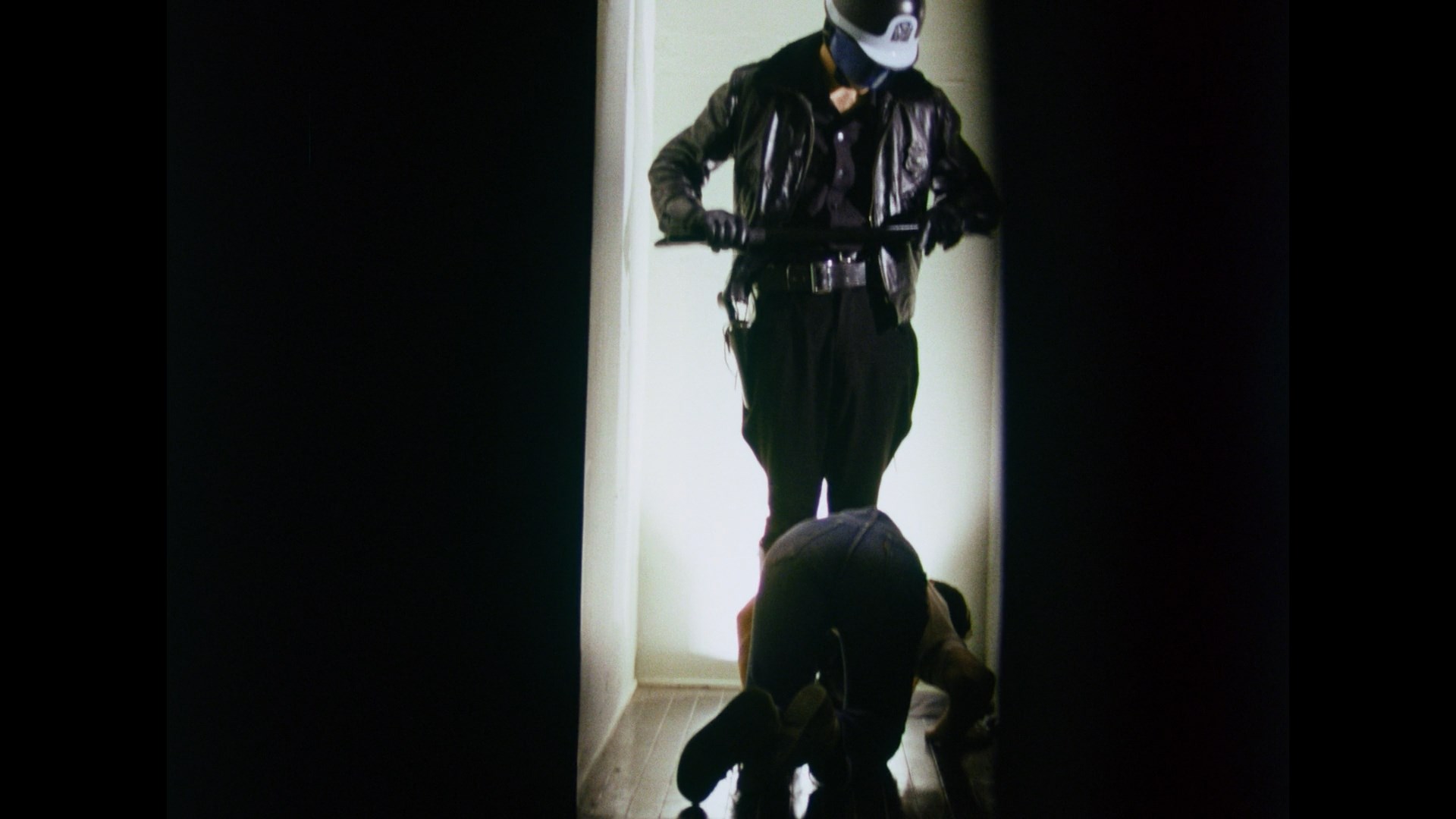 service, Exploitation.tv. Now they've been collected
service, Exploitation.tv. Now they've been collected 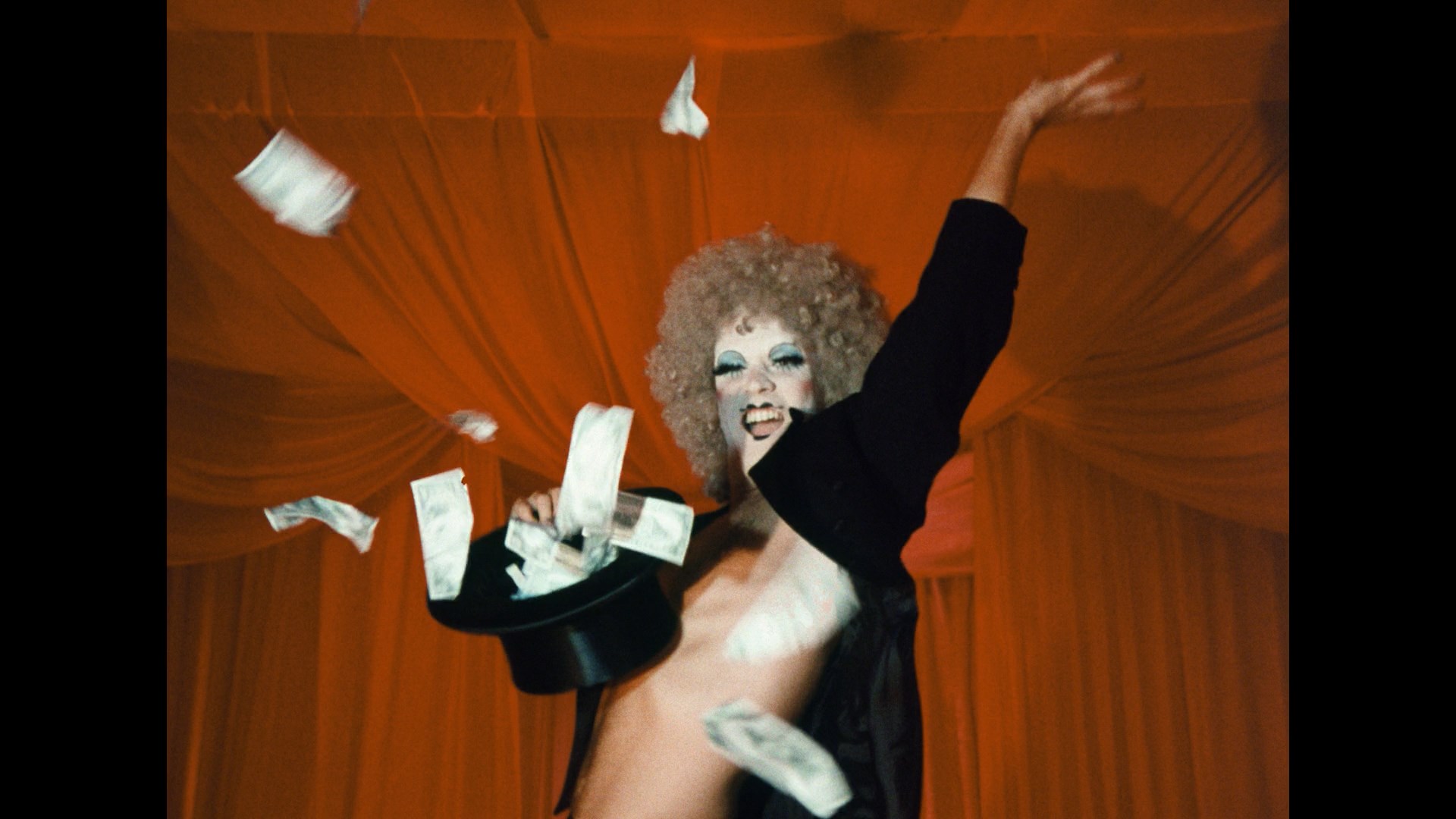 on Blu-ray and two-disc DVD by the good folks at Altered Innocence, whose commitment to blurring the lines between art and pornography pays dividends here as well with a body of work at the juncture between the avant garde, gay porn, and borderline horror. These won't be for all tastes, obviously, but they're important viewing as well as amusing to see for how much they ended up being assimilated by Hollywood in (very scorned) films like Cruising, The Choirboys, and Partners.
on Blu-ray and two-disc DVD by the good folks at Altered Innocence, whose commitment to blurring the lines between art and pornography pays dividends here as well with a body of work at the juncture between the avant garde, gay porn, and borderline horror. These won't be for all tastes, obviously, but they're important viewing as well as amusing to see for how much they ended up being assimilated by Hollywood in (very scorned) films like Cruising, The Choirboys, and Partners.
Up first is his most famous film by far, 1972's LA Plays Itself (55m17s), which essentially plays like two short films grafted together: an idyllic morning encounter outside the Los Angeles city limits between Halsted and a young man (Rick Coates), and a harrowing S&M session inside the city accompanied by narration about the state of modern society and lots of great location coverage. The film's notorious, oft-censored closing salvo is still more than most viewers can handle today and was completely clipped from the prior VCA release, turning an already very brief feature into a glorified short film. The version here is complete and uncensored though, full restored here in immaculate quality. As with the other films in the set, it features a crisp DTS-HD MA 1.0 mono track 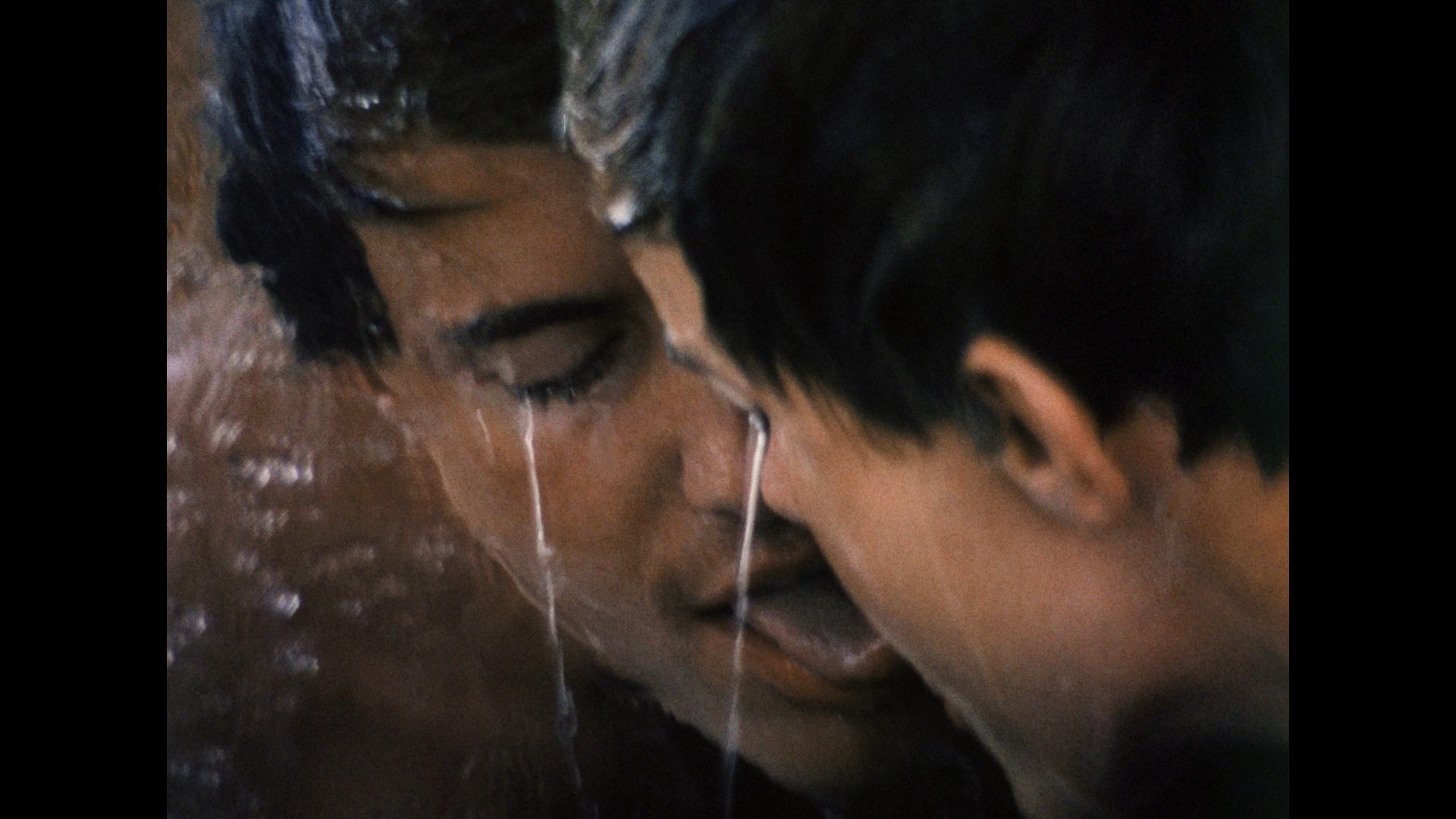 with optional English, Spanish, and French subtitles, perfect for the next time you feel like going cruising
with optional English, Spanish, and French subtitles, perfect for the next time you feel like going cruising 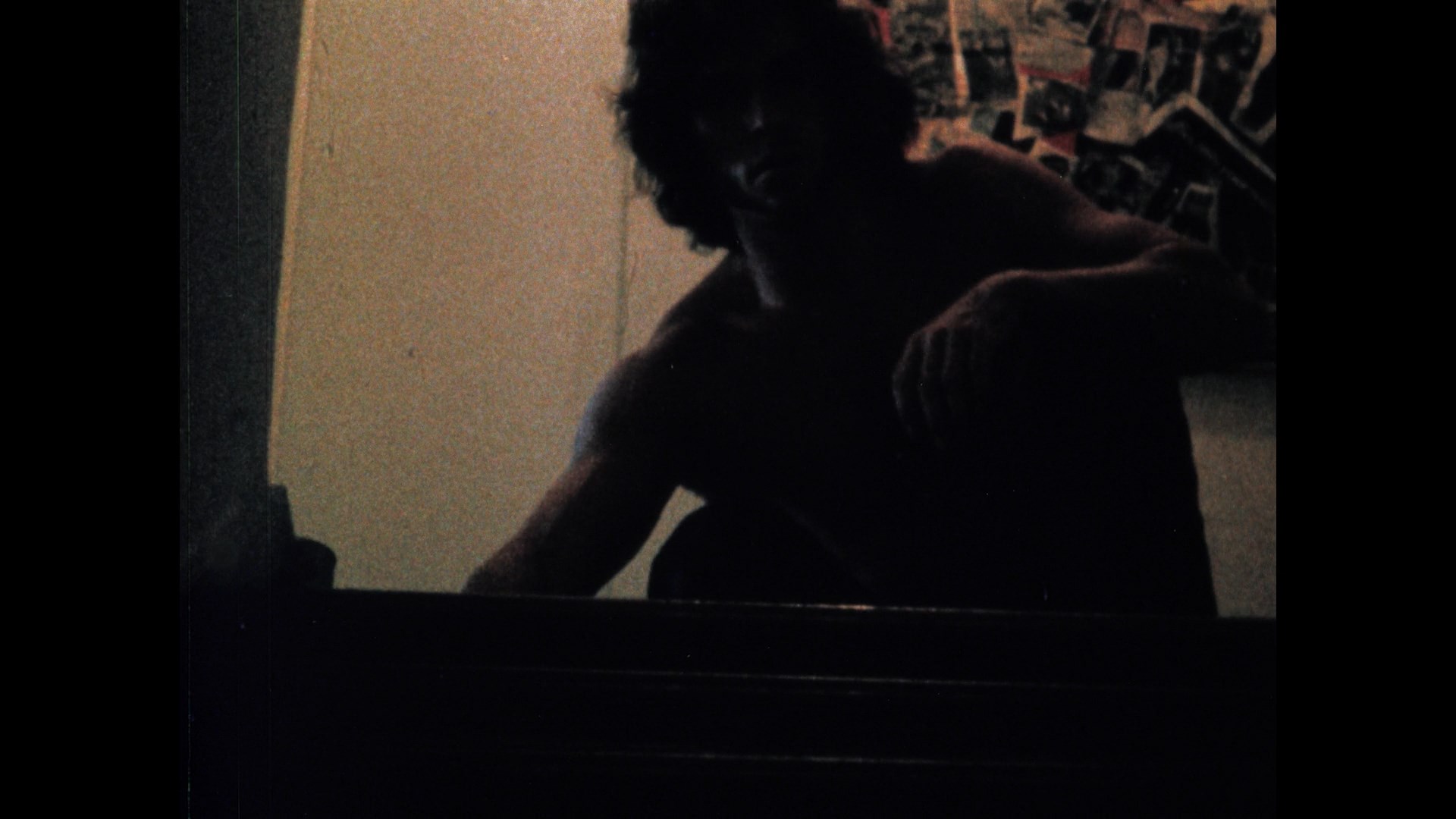 in Montreal.
in Montreal.
Next up is Halsted's most ambitious feature and the closest thing to a porno chic crossover in his repertoire, 1975's Sextool (61m6s). The influence of friend Kenneth Anger is all over this one (not to mention Luchino Visconti) as this production, shot on vibrant 35mm, is far more of an art film than a porn one; there is explicit sex (some of it pretty boundary-pushing), but it's handled in such an abstract fashion it's far from the way pornography usually functions. There isn't much of a "plot" per se, but it involves a sailor coming to a ritzy, out-there party populated by gay scene archetypes where he gets initiated into a wide range of sexual practices. Along the way you get some drag cabaret fun, questionable use of fruits and footwear, a nightstick scene foreshadowing the one in Crimes of Passion, and a whole lot of leather and piano playing. Finally the main triple feature wraps up with 1972's The Sex Garage (35m9s), a black-and-white short intended to run with L.A. Plays Itself but instead shown on its own (to a likely very baffled audience). It mostly takes place in an auto garage where a mechanic is being serviced by his girlfriend (to the strains of Carla Thomas' "When Tomorrow Comes") before the afternoon takes a sudden detour with the arrival of two very different, sex-hungry men. Extra points for this one likely featuring the first scene of copulation between a human and a motor vehicle, something later dallied with by filmmakers like David Cronenberg,  Ridley Scott, and Julia Ducournau.
Ridley Scott, and Julia Ducournau.
In addition to the three films, the release is packed with bonus features that will probably 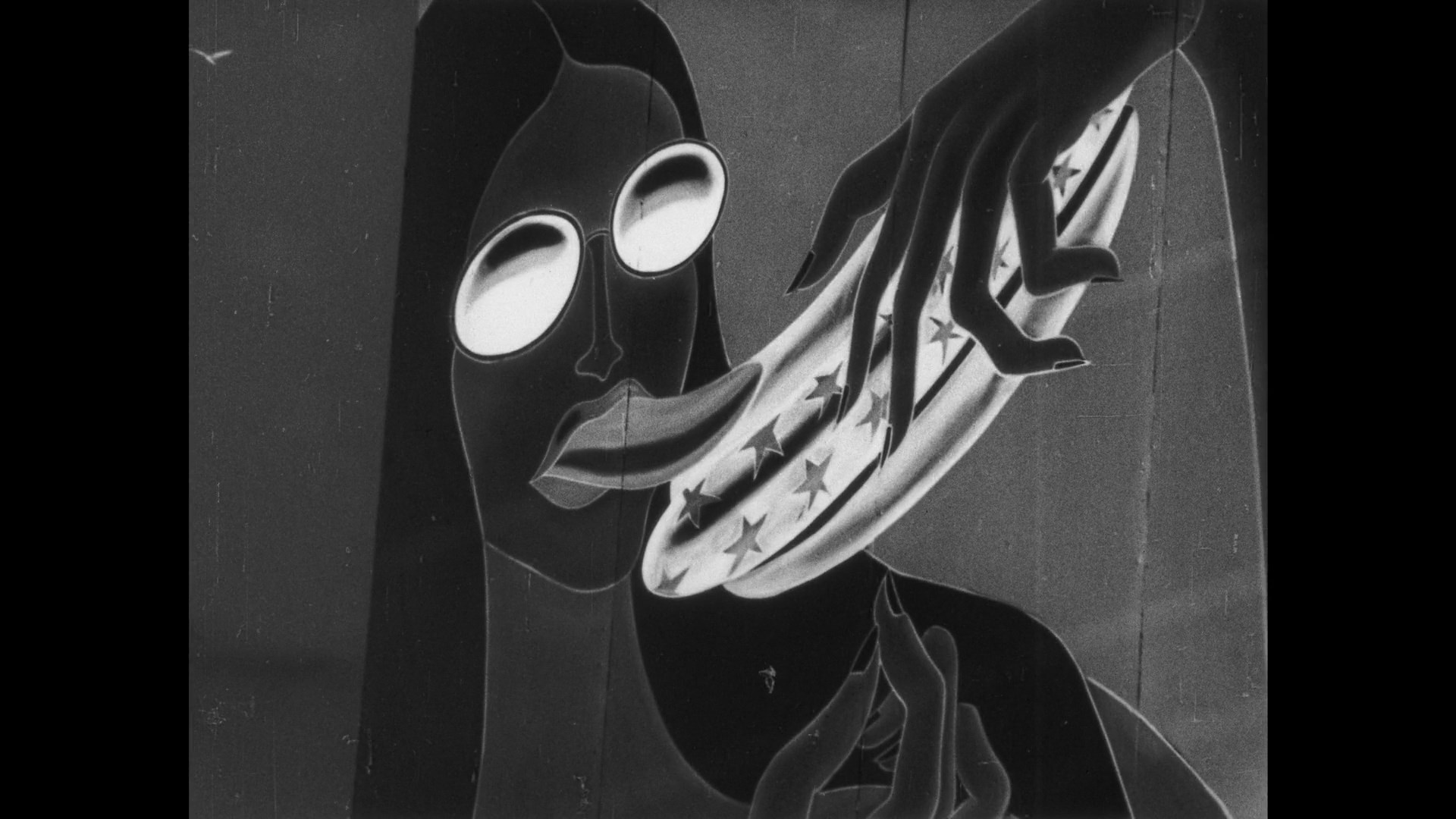 raise as many questions as they answer given the self-created image Halsted liked to project. Ask Any Buddy's Evan Purchell, K.J. Shepherd, and Tyler Thomas provide thorough new commentaries for the first two films while Purchell goes solo for The Sex Garage, parsing through the facts of Halsted's life, his seemingly contradictory political stances, the gay adult scene at the time, the filmmaking culture of Los Angeles, where these films played, and much more. A video interview with Halsted Plays Himself author William E. Jones (38m24s) covers his own experience making compilation videos for VCA as a result of his experimental film teaching, the way Halsted's work spoke to him, the process of writing the biography, the attempts to bring women into the world of gay cinema, and his thoughts on the individual films. The Whitney Strub video essay "Sanitizing Halsted" (27m22s) offers an academic look at the transgressive nature of his imagery and the attempts of the U.S. government to put a severe damper on that kind of material, some of which still lingers today in certain states. In "Crossing Over: Sextool" (9m14s), Caden Mark Gardner delivers a voiceover look at the product's doomed attempt to bridge the gap between art cinemas and adult cinema with its
raise as many questions as they answer given the self-created image Halsted liked to project. Ask Any Buddy's Evan Purchell, K.J. Shepherd, and Tyler Thomas provide thorough new commentaries for the first two films while Purchell goes solo for The Sex Garage, parsing through the facts of Halsted's life, his seemingly contradictory political stances, the gay adult scene at the time, the filmmaking culture of Los Angeles, where these films played, and much more. A video interview with Halsted Plays Himself author William E. Jones (38m24s) covers his own experience making compilation videos for VCA as a result of his experimental film teaching, the way Halsted's work spoke to him, the process of writing the biography, the attempts to bring women into the world of gay cinema, and his thoughts on the individual films. The Whitney Strub video essay "Sanitizing Halsted" (27m22s) offers an academic look at the transgressive nature of his imagery and the attempts of the U.S. government to put a severe damper on that kind of material, some of which still lingers today in certain states. In "Crossing Over: Sextool" (9m14s), Caden Mark Gardner delivers a voiceover look at the product's doomed attempt to bridge the gap between art cinemas and adult cinema with its 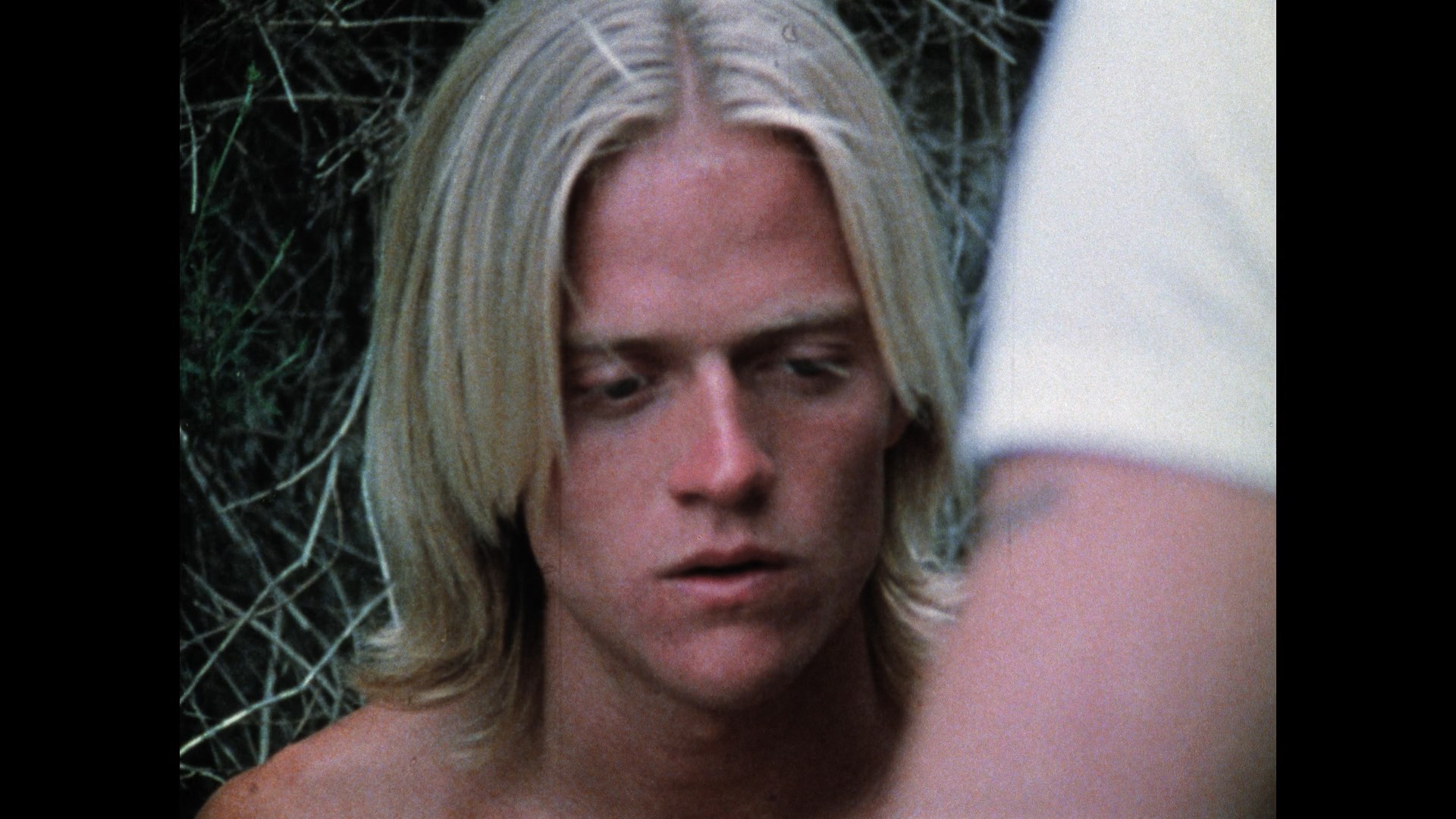 depiction of avant-garde kink and fantasies as filtered through the Hollywood scene. The original 3m16s opening of LA Plays Itself shows the bridging sequence used when the two sequences first ran in the opposite order, followed
depiction of avant-garde kink and fantasies as filtered through the Hollywood scene. The original 3m16s opening of LA Plays Itself shows the bridging sequence used when the two sequences first ran in the opposite order, followed 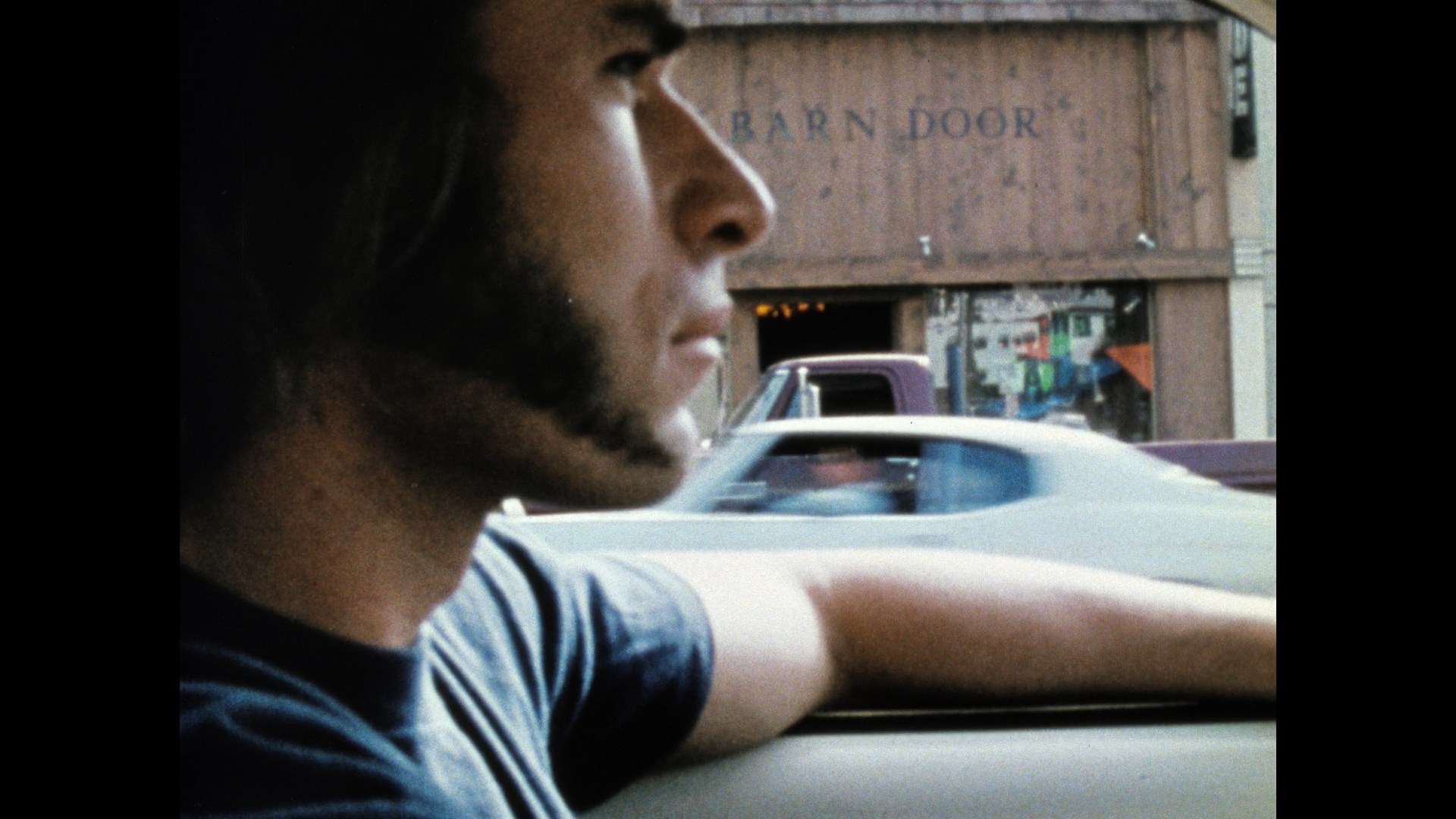 by a reconstruction of the original test screening opening of Sextool (4m54s) before it was tinkered a bit for its release. But wait! There's also an entire bonus Halsted film, the formerly lost Truck It, which features a Purchell video intro (3m39s) and is viewable either in its shortened 8mm silent loop version (26m30s) or a lower quality VHS rip of the full feature (52m17s), both interesting for the editorial ways they tackle the impressionistic look at a straight and gay-sexed filled string of road trips. A hefty gallery (8m43s) of promotional ephemera is fascinating as well, including promo photos and video art (plus covers for a bit of Halsted's magazine output). Finally you get trailers for Sextool, an Altered Innocence double feature roadshow of LA and Sextool, and this collection itself, plus bonus trailers for Arrebato, Equation to an Unknown, Knife + Heart, and Queercore: How to Punk a Revolution. The packaging also comes with a 20-page booklet featuring essays about Halsted and his work by Jones and Bradford Nordeen.
by a reconstruction of the original test screening opening of Sextool (4m54s) before it was tinkered a bit for its release. But wait! There's also an entire bonus Halsted film, the formerly lost Truck It, which features a Purchell video intro (3m39s) and is viewable either in its shortened 8mm silent loop version (26m30s) or a lower quality VHS rip of the full feature (52m17s), both interesting for the editorial ways they tackle the impressionistic look at a straight and gay-sexed filled string of road trips. A hefty gallery (8m43s) of promotional ephemera is fascinating as well, including promo photos and video art (plus covers for a bit of Halsted's magazine output). Finally you get trailers for Sextool, an Altered Innocence double feature roadshow of LA and Sextool, and this collection itself, plus bonus trailers for Arrebato, Equation to an Unknown, Knife + Heart, and Queercore: How to Punk a Revolution. The packaging also comes with a 20-page booklet featuring essays about Halsted and his work by Jones and Bradford Nordeen.
Reviewed on December 1, 2021



 milestone filmmaking in the adult film industry throughout the
milestone filmmaking in the adult film industry throughout the  '70s and early '80s is one that film historians and mainstream video companies are still coming to terms with to varying degrees, from the most mainstream-ish porno chic hits to the grungiest extreme filmmakers who sent Congress into hissyfits. Where the straight XXX world was pushed to its darkest limits by the folks at Avon Films, the gay scene had one of its most daring voices in Fred Halsted, an L.A.-based sadistic satyr who made history when three of his films were acquired for the collection of the Museum of Modern Art (who famously screened two of them in 1974). His excessive behavior led to his professional burnout by the early '80s and his premature end in 1989, but his work is still as raw, shocking, and sometimes delightful as when it first shocked viewers decades ago. Trying to see his films uncensored has been something of a daunting task for much of the home video era, but his major works were eventually restored and could be seen at one point on the new defunct Vinegar Syndrome-based streaming
'70s and early '80s is one that film historians and mainstream video companies are still coming to terms with to varying degrees, from the most mainstream-ish porno chic hits to the grungiest extreme filmmakers who sent Congress into hissyfits. Where the straight XXX world was pushed to its darkest limits by the folks at Avon Films, the gay scene had one of its most daring voices in Fred Halsted, an L.A.-based sadistic satyr who made history when three of his films were acquired for the collection of the Museum of Modern Art (who famously screened two of them in 1974). His excessive behavior led to his professional burnout by the early '80s and his premature end in 1989, but his work is still as raw, shocking, and sometimes delightful as when it first shocked viewers decades ago. Trying to see his films uncensored has been something of a daunting task for much of the home video era, but his major works were eventually restored and could be seen at one point on the new defunct Vinegar Syndrome-based streaming  service, Exploitation.tv. Now they've been collected
service, Exploitation.tv. Now they've been collected  on Blu-ray and two-disc DVD by the good folks at Altered Innocence, whose commitment to blurring the lines between art and pornography pays dividends here as well with a body of work at the juncture between the avant garde, gay porn, and borderline horror. These won't be for all tastes, obviously, but they're important viewing as well as amusing to see for how much they ended up being assimilated by Hollywood in (very scorned) films like Cruising, The Choirboys, and Partners.
on Blu-ray and two-disc DVD by the good folks at Altered Innocence, whose commitment to blurring the lines between art and pornography pays dividends here as well with a body of work at the juncture between the avant garde, gay porn, and borderline horror. These won't be for all tastes, obviously, but they're important viewing as well as amusing to see for how much they ended up being assimilated by Hollywood in (very scorned) films like Cruising, The Choirboys, and Partners. with optional English, Spanish, and French subtitles, perfect for the next time you feel like going cruising
with optional English, Spanish, and French subtitles, perfect for the next time you feel like going cruising  in Montreal.
in Montreal. Ridley Scott, and Julia Ducournau.
Ridley Scott, and Julia Ducournau.  raise as many questions as they answer given the self-created image Halsted liked to project. Ask Any Buddy's Evan Purchell, K.J. Shepherd, and Tyler Thomas provide thorough new commentaries for the first two films while Purchell goes solo for The Sex Garage, parsing through the facts of Halsted's life, his seemingly contradictory political stances, the gay adult scene at the time, the filmmaking culture of Los Angeles, where these films played, and much more. A video interview with Halsted Plays Himself author William E. Jones (38m24s) covers his own experience making compilation videos for VCA as a result of his experimental film teaching, the way Halsted's work spoke to him, the process of writing the biography, the attempts to bring women into the world of gay cinema, and his thoughts on the individual films. The Whitney Strub video essay "Sanitizing Halsted" (27m22s) offers an academic look at the transgressive nature of his imagery and the attempts of the U.S. government to put a severe damper on that kind of material, some of which still lingers today in certain states. In "Crossing Over: Sextool" (9m14s), Caden Mark Gardner delivers a voiceover look at the product's doomed attempt to bridge the gap between art cinemas and adult cinema with its
raise as many questions as they answer given the self-created image Halsted liked to project. Ask Any Buddy's Evan Purchell, K.J. Shepherd, and Tyler Thomas provide thorough new commentaries for the first two films while Purchell goes solo for The Sex Garage, parsing through the facts of Halsted's life, his seemingly contradictory political stances, the gay adult scene at the time, the filmmaking culture of Los Angeles, where these films played, and much more. A video interview with Halsted Plays Himself author William E. Jones (38m24s) covers his own experience making compilation videos for VCA as a result of his experimental film teaching, the way Halsted's work spoke to him, the process of writing the biography, the attempts to bring women into the world of gay cinema, and his thoughts on the individual films. The Whitney Strub video essay "Sanitizing Halsted" (27m22s) offers an academic look at the transgressive nature of his imagery and the attempts of the U.S. government to put a severe damper on that kind of material, some of which still lingers today in certain states. In "Crossing Over: Sextool" (9m14s), Caden Mark Gardner delivers a voiceover look at the product's doomed attempt to bridge the gap between art cinemas and adult cinema with its  depiction of avant-garde kink and fantasies as filtered through the Hollywood scene. The original 3m16s opening of LA Plays Itself shows the bridging sequence used when the two sequences first ran in the opposite order, followed
depiction of avant-garde kink and fantasies as filtered through the Hollywood scene. The original 3m16s opening of LA Plays Itself shows the bridging sequence used when the two sequences first ran in the opposite order, followed  by a reconstruction of the original test screening opening of Sextool (4m54s) before it was tinkered a bit for its release. But wait! There's also an entire bonus Halsted film, the formerly lost Truck It, which features a Purchell video intro (3m39s) and is viewable either in its shortened 8mm silent loop version (26m30s) or a lower quality VHS rip of the full feature (52m17s), both interesting for the editorial ways they tackle the impressionistic look at a straight and gay-sexed filled string of road trips. A hefty gallery (8m43s) of promotional ephemera is fascinating as well, including promo photos and video art (plus covers for a bit of Halsted's magazine output). Finally you get trailers for Sextool, an Altered Innocence double feature roadshow of LA and Sextool, and this collection itself, plus bonus trailers for Arrebato, Equation to an Unknown, Knife + Heart, and Queercore: How to Punk a Revolution. The packaging also comes with a 20-page booklet featuring essays about Halsted and his work by Jones and Bradford Nordeen.
by a reconstruction of the original test screening opening of Sextool (4m54s) before it was tinkered a bit for its release. But wait! There's also an entire bonus Halsted film, the formerly lost Truck It, which features a Purchell video intro (3m39s) and is viewable either in its shortened 8mm silent loop version (26m30s) or a lower quality VHS rip of the full feature (52m17s), both interesting for the editorial ways they tackle the impressionistic look at a straight and gay-sexed filled string of road trips. A hefty gallery (8m43s) of promotional ephemera is fascinating as well, including promo photos and video art (plus covers for a bit of Halsted's magazine output). Finally you get trailers for Sextool, an Altered Innocence double feature roadshow of LA and Sextool, and this collection itself, plus bonus trailers for Arrebato, Equation to an Unknown, Knife + Heart, and Queercore: How to Punk a Revolution. The packaging also comes with a 20-page booklet featuring essays about Halsted and his work by Jones and Bradford Nordeen.